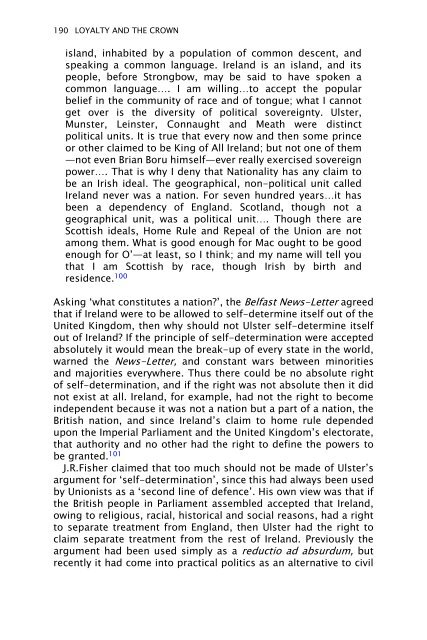Dividing Ireland: World War I and Partition
Dividing Ireland: World War I and Partition
Dividing Ireland: World War I and Partition
You also want an ePaper? Increase the reach of your titles
YUMPU automatically turns print PDFs into web optimized ePapers that Google loves.
190 LOYALTY AND THE CROWN<br />
isl<strong>and</strong>, inhabited by a population of common descent, <strong>and</strong><br />
speaking a common language. <strong>Irel<strong>and</strong></strong> is an isl<strong>and</strong>, <strong>and</strong> its<br />
people, before Strongbow, may be said to have spoken a<br />
common language…. I am willing…to accept the popular<br />
belief in the community of race <strong>and</strong> of tongue; what I cannot<br />
get over is the diversity of political sovereignty. Ulster,<br />
Munster, Leinster, Connaught <strong>and</strong> Meath were distinct<br />
political units. It is true that every now <strong>and</strong> then some prince<br />
or other claimed to be King of All <strong>Irel<strong>and</strong></strong>; but not one of them<br />
—not even Brian Boru himself—ever really exercised sovereign<br />
power…. That is why I deny that Nationality has any claim to<br />
be an Irish ideal. The geographical, non-political unit called<br />
<strong>Irel<strong>and</strong></strong> never was a nation. For seven hundred years…it has<br />
been a dependency of Engl<strong>and</strong>. Scotl<strong>and</strong>, though not a<br />
geographical unit, was a political unit…. Though there are<br />
Scottish ideals, Home Rule <strong>and</strong> Repeal of the Union are not<br />
among them. What is good enough for Mac ought to be good<br />
enough for O’—at least, so I think; <strong>and</strong> my name will tell you<br />
that I am Scottish by race, though Irish by birth <strong>and</strong><br />
residence. 100<br />
Asking ‘what constitutes a nation?’, the Belfast News-Letter agreed<br />
that if <strong>Irel<strong>and</strong></strong> were to be allowed to self-determine itself out of the<br />
United Kingdom, then why should not Ulster self-determine itself<br />
out of <strong>Irel<strong>and</strong></strong>? If the principle of self-determination were accepted<br />
absolutely it would mean the break-up of every state in the world,<br />
warned the News-Letter, <strong>and</strong> constant wars between minorities<br />
<strong>and</strong> majorities everywhere. Thus there could be no absolute right<br />
of self-determination, <strong>and</strong> if the right was not absolute then it did<br />
not exist at all. <strong>Irel<strong>and</strong></strong>, for example, had not the right to become<br />
independent because it was not a nation but a part of a nation, the<br />
British nation, <strong>and</strong> since <strong>Irel<strong>and</strong></strong>’s claim to home rule depended<br />
upon the Imperial Parliament <strong>and</strong> the United Kingdom’s electorate,<br />
that authority <strong>and</strong> no other had the right to define the powers to<br />
be granted. 101<br />
J.R.Fisher claimed that too much should not be made of Ulster’s<br />
argument for ‘self-determination’, since this had always been used<br />
by Unionists as a ‘second line of defence’. His own view was that if<br />
the British people in Parliament assembled accepted that <strong>Irel<strong>and</strong></strong>,<br />
owing to religious, racial, historical <strong>and</strong> social reasons, had a right<br />
to separate treatment from Engl<strong>and</strong>, then Ulster had the right to<br />
claim separate treatment from the rest of <strong>Irel<strong>and</strong></strong>. Previously the<br />
argument had been used simply as a reductio ad absurdum, but<br />
recently it had come into practical politics as an alternative to civil








